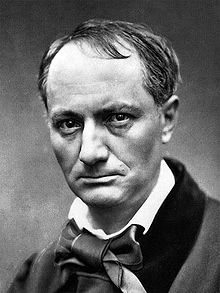Pierre Charles Baudelaire (9 April 1821 - 31 August 1867) was a French poet whose most famous work Les Fleurs du mal (The Flowers of Evil), first published in 1857, "expresses the changing nature of beauty in industrializing Paris during the 19th century."

Charles Baudelaire: 1821-1867
"Known for his highly controversial and often dark poetry, Baudelaire's life was filled with drama and strife, from financial disaster to being prosecuted for obscenity and blasphemy. Long after his death many look upon his name as representing depravity and vice: others see him as being the poet of modern civilization, seeming to speak directly to the 20th century".
In 1841 his stepfather sent him on a voyage to Calcutta, India "in the hope of ending his dissolute habits". The voyage took him around the Cape of Good Hope at the southern tip of Africa (where his ship, the Paquebot des Mers du Sud was damaged in a storm) when he would surely have seen albatrosses at sea. He left the ship in Mauritius and then returned to France: "the trip provided strong impressions of the sea, sailing, and exotic ports, that he later employed in his poetry" (click here).
Baudelaire's poem L'Albatros appeared in the first edition of Les Fleurs du mal and tells of the plight of an albatross caught and brought aboard a ship, comparing it to the poet "stranded on the earth". It has been reported that this poem was based on personal experience and his concern for the bird during his journey to and from Mauritius and Reunion in 1841.
L'Albatros
Souvent, pour s'amuser, les hommes d'équipage
Prennent des albatros, vastes oiseaux des mers,
Qui suivent, indolents compagnons de voyage,
Le navire glissant sur les gouffres amers.
À peine les ont-ils déposés sur les planches,
Que ces rois de l'azur, maladroits et honteux,
Laissent piteusement leurs grandes ailes blanches
Comme des avirons traîner à côté d'eux.
Ce voyageur ailé, comme il est gauche et veule!
Lui, naguère si beau, qu'il est comique et laid!
L'un agace son bec avec un brûle-gueule,
L'autre mime, en boitant, l'infirme qui volait!
Le Poète est semblable au prince des nuées
Qui hante la tempête et se rit de l'archer;
Exilé sur le sol au milieu des huées,
Ses ailes de géant l'empêchent de marcher.
The Albatross
Sometimes for sport the men of loafing crews
Snare the great albatrosses of the deep,
The indolent companions of their cruise
As through the bitter vastitudes they sweep.
Scarce have they fished aboard these airy kings
When helpless on such unaccustomed floors,
They piteously droop their huge white wings
And trail them at their sides like drifting oars.
How comical, how ugly, and how meek
Appears this soarer of celestial snows!
One, with his pipe, teases the golden beak,
One, limping, mocks the cripple as he goes.
The Poet, like this monarch of the clouds,
Despising archers, rides the storm elate.
But, stranded on the earth to jeering crowds,
The great wings of the giant baulk his gait.
Translation by Roy Campbell (click here).
Click here to view a video clip of an animated Baudelaire reciting his poem.
Click here to read a poem on an albatross with a similar theme by the Mexican poet Eduard Langagne.
With thanks to Karen Bourgeois for information.
John Cooper, ACAP Information Officer, 27 September 2011

 Français
Français  English
English  Español
Español